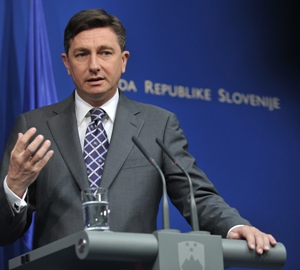NEWS
Prime Minister’s press conference
At today's session, the Slovenian Government, alongside other resolutions, adopted the proposal for the Family Code and the proposal for the Services in the Internal Market Act, while also taking note of the Defence Ministry's report on the tender for renting Falcon aircraft. Prime Minister Borut Pahor and the responsible ministers first outlined the major resolutions, and Mr Pahor then answered a number of topical questions posed to him.
(Foto: Tamino Petelinšek/STA)
The Government agreed on the text of the proposed Family Code, which is to be submitted to the National Assembly for discussion and adoption. The Code proposal regulates matrimony and relations between spouses, extramarital unions, the relation established through childbirth and adoption between parents and the child, as well as foster care and guardianship for children and other persons requiring special care. The proposed Family Code preserves the basic orientation of the arrangement of family relations, in particular the principle, defined in the code, of the benefit of the child. The provisions defining the legal instruments through which the state protects children who are not being cared for by their parents or who are without parents, or who are not enjoying proper parental care (foster care, guardianship and adoption) also remain unaltered. A new development has been introduced in the area of the marital property regime, enabling spouses to choose and determine the content of their own property regime. For the first time, the new Code also introduces prohibition of physical punishment of children and other forms of humiliating treatment, which is not only binding upon parents, but also on other people, state authorities and holders of public offices.
The ministerial corps today agreed on the text of the proposed Services in the Internal Market Act, which particularly relates to administrative simplification of the provision of services, the quality of services and administrative co-operation between the competent bodies of Member States. An important goal of the simplification of procedures is the requirement for the introduction of electronic contact points (ECPs), whose proper functioning is a pre-condition for correct and successful transposition of the relevant Directive of the European Parliament and the Council into the Slovenian legal order. The Slovenian ECP, linked with responsible bodies, will enable all EU service providers to perform any procedures or formalities for the take-up and provision of services in Slovenia via remote and electronic modes. Through the ECP, providers and recipients will also be able to obtain updated and clear information regarding services in the Republic of Slovenia.
At today's session, the Slovenian Government also took note of the Defence Ministry's report on the tender for renting Falcon aircraft. It agreed that the Ministry of Defence should take a decision on the suspension of the tender procedure published in the Official Gazette of the Republic of Slovenia of 22 May 2009 related to rental of the aircraft by way of a public call for tenders. Pursuant to the Government's agreement, the Defence Ministry will, without delay, carry out the procedure for renting the Falcon aircraft for management by the most favourable tenderer in compliance with the public-procurement procedure and under the negotiated procedure without prior publication.
The ministerial corps also adopted the conclusions related to Annex 2 to the General Agreement for Contract 2009. Pursuant to the provisions of the Health Care and Health Insurance Act, a general agreement of this kind is adopted each year by the Slovenian Ministry of Health, the Health Insurance Institute, the Association of Health Institutions, the Medical Chamber, the Chamber of Pharmacy, the Natural Health Resorts Association, the Association of Social Institutions and the Association of Rehabilitation Organisations. Within the adoption procedure related to Annex 2 to the General Agreement on Contract 2009, the Government discussed the disputed issues, on which stakeholders could not reach an agreement. In doing so, it decided that, within the implementation of the anti-crisis measures, the calculation of service-related price elements for the primary level should be increased, while the valuation of laboratory services should also improve. For the purpose of attaining higher competitiveness among the providers and improving accessibility and reducing prices charged by service providers, the previous year saw the introduction of a mechanism facilitating national calls for tenders for the selection of the most favourable provider of specific health programmes.




